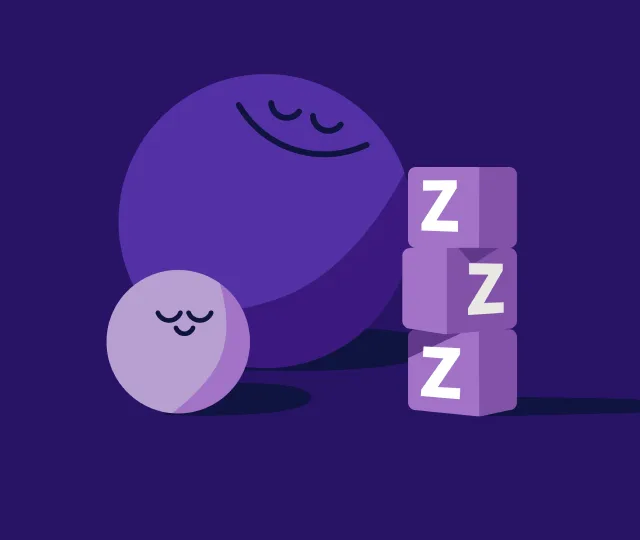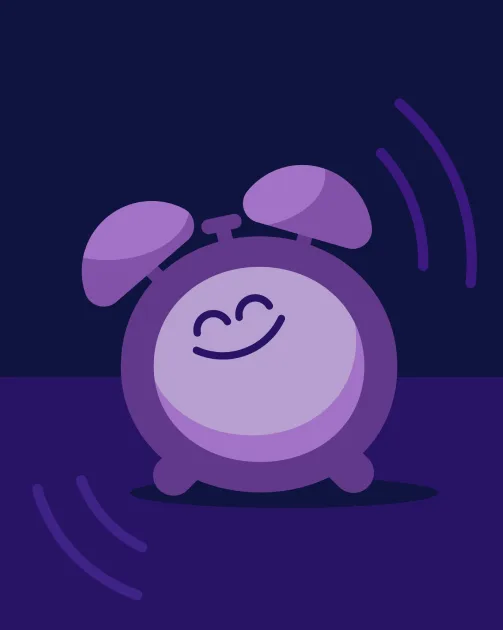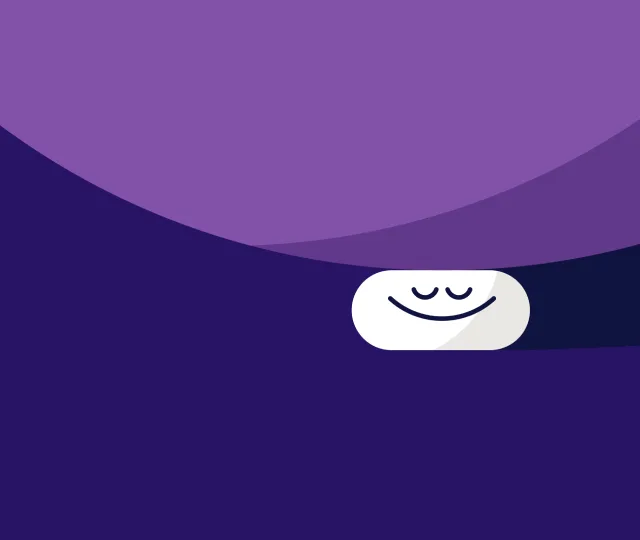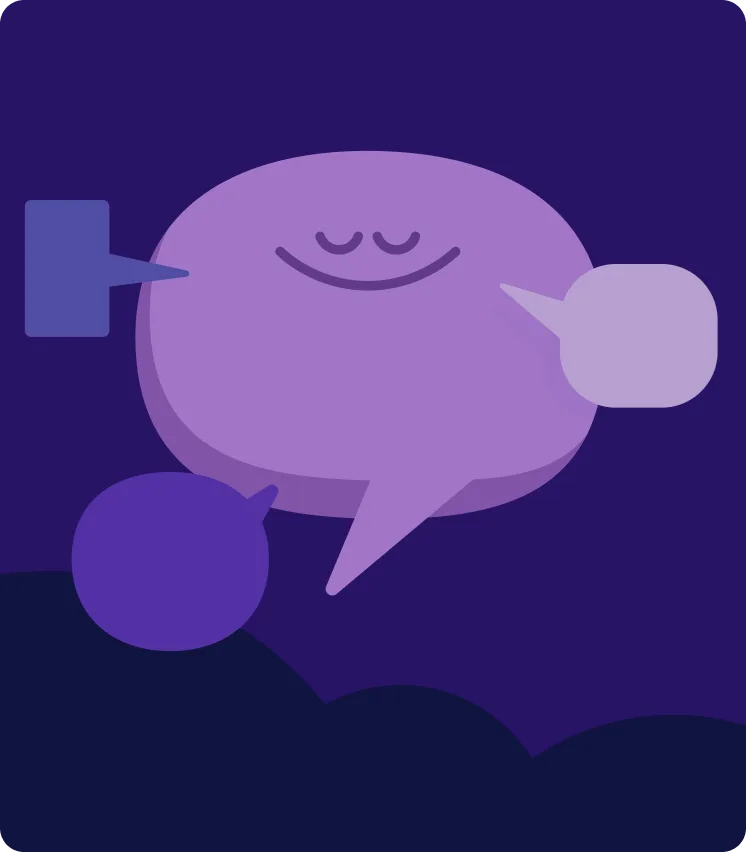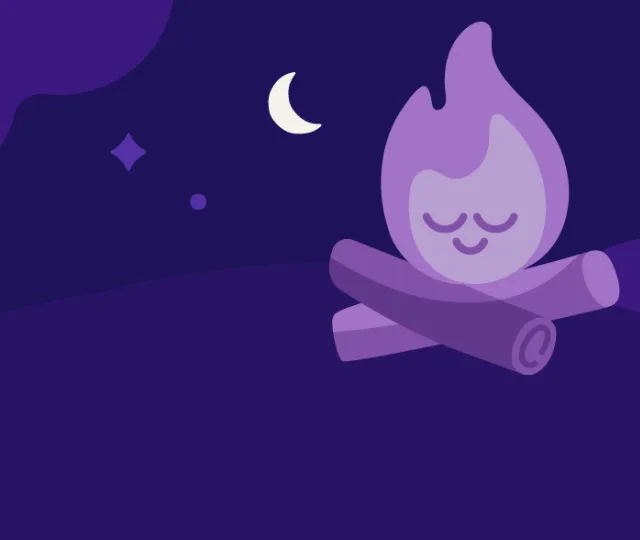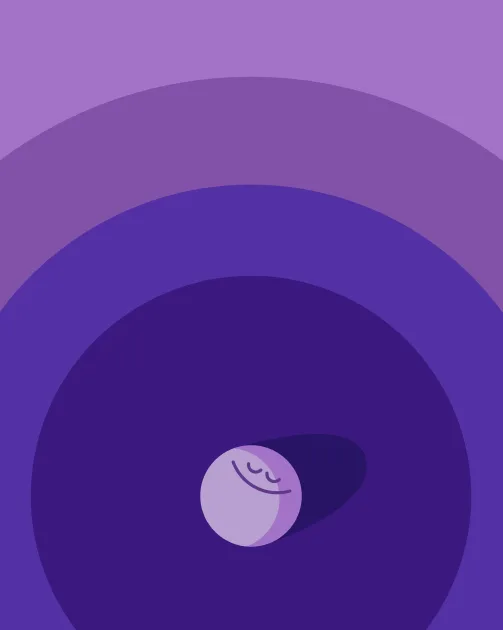Trouble falling asleep
By Your Headspace Mindfulness & Meditation Experts
Nov 3, 2023
It’d be nice if you could sink like a stone into sleep as soon as your head hits the pillow. But for most people, that’s not quite how it works.
Adults need between seven and nine hours of sleep per night, according to the CDC, but many people struggle to meet that benchmark. A recent study found that about 1 in 3 adults aren’t getting the recommended amount of rest, a trend linked to everything from impaired memory to weakened immune function. And it’s not just about the quantity of hours—sleep quality plays a crucial role in overall health, too.
You can be in bed for eight hours a night, but are body and mind receiving the required deep, restorative rest? The body might be exhausted, but is the mind calm enough to allow for a restful night’s sleep?
It could be argued that these questions are enough to keep you awake at night, but that would defeat the object. But it is worthwhile — maybe some time during your day — to examine the underlying factors as to why you are having trouble falling asleep.
Wind down for a restful night’s sleep
Try this simple visualization to soothe the mind and relax the body, creating the ideal sleep conditions.

Switching Off
2 mins
Why you might have difficulty sleeping
We’ve all been there. You do everything right — you go to bed on time, stay away from all devices a good hour before lights out, and feel 100% ready to nod off at a moment’s notice. But then sleep proves elusive and the mind goes into overdrive.
Why? Because once the day’s preoccupation — work, family, chores, news — falls away, a busy mind, suddenly free from distraction, surfaces all thoughts, as if a filter has been removed. So many people who experience restless sleep are basically struggling to settle their mind. And even when the body is sleeping, a restless, overactive mind can also wake you up … and create difficulty in drifting off again.
Biological factors can complicate things, too, including chronic pain, breathing issues, digestive issues, or psychiatric disorders. Eating too late, eating spicy foods, or consuming too much caffeine can also impact quality sleep.
And the modern day has brought screen time to the mix — a 2015 study found that using devices such as cell phones and e-readers disrupts our circadian rhythm — the natural, internal process that governs our sleep-wake cycle.

The consequences of going without good sleep
Consistently having trouble sleeping and not getting sufficient sleep can leave long-term physical effects. Sleep deprivation has been linked to increased risk for chronic diseases, including type 2 diabetes, cardiovascular disease, obesity, and depression. It can also mess with our clarity of mind, causing short-term and long-term memory issues.
Good sleep, as you might’ve guessed, has the opposite impact. Regular, healthy sleep can boost your immune system, improve your daily mood, quicken muscle recovery, help prevent weight gain, and lower the risk for chronic diseases like heart disease and diabetes, according to the Office of Disease Prevention and Health Promotion.
Most people will experience periods of sleeplessness at some point in their life. The good news is that it doesn’t have to last. In the long run, your body will get the restorative sleep it needs. So whether you’re having a rough period of sleep or struggling with insomnia, the following suggestions might prove useful.
Good habits can help those having trouble falling asleep
Investing in having good sleep hygiene, or healthy sleep habits that can help create the ideal conditions for restful sleep, can go a long way in getting better sleep. It doesn’t happen overnight, but teaching your mind and body how to relax before bed might be all you need to turn around your sleep.
The Mayo Clinic says that changing sleep habits is enough to restore good sleep for many people with insomnia, and only after trying sleep hygiene improvements do doctors move on to cognitive behavioral therapy or medications.
The big stumbling block that everyone runs into when falling asleep at bedtime or waking up in the middle of night, is “trying” too hard to drift off. The moment we “try” to do anything, there is a degree of effort involved (not to mention, mounting frustration). Too much effort actually gets in the way of rest and sleep.
The key to falling back to sleep is creating the conditions conducive to sleep … and that means winding down the mind.
One of the best hacks for unwinding the mind is to count backward from 1,000. You can mentally count or visualize the numbers, counting down from 999, 998, 997, and so on. The number becomes the object of focus for the mind and, without effort, the repetitive, steady, slow counting backwards is a great unwinding exercise. And if the mind tries to think, return to picking up the counting.
Outside of counting backwards, here are some other tips to help you along
- Listen to a sleepcast.
Forty-five minutes long, sleepcasts are nonlinear, narrated tours of dreamy environments that encourage relaxation. Give one a try, relax into storyland, and drift off into the land of nod.

Midnight Launderette, a Sleepcast by Headspace
10 mins
- Put on sleep music.
Sleep music from Headspace, lasting anywhere between 10-60 minutes, provides a soothing baseline of sound to help you power down and fall asleep. Choose white noise or a nature-inspired soundscape to create ambient conditions for restful sleep.

Sleep Music: Singing Pines
45 mins
- Create restful conditions.
Is your bedroom too warm? If it’s above 67 degrees Fahrenheit or 19 degrees Celsius, it might well be. Turn on the air conditioning, turn down the heat, or turn on a fan. Keeping your room as dark as possible also helps create conditions conducive for sleep.
- Leave your devices alone.
The first thing many people do, either before sleep or when waking up, is reach for their phone … and all this does is stimulate the mind, which defeats the point of winding down.
How meditation and mindfulness can help
A 2015 study of people who had trouble sleeping had half of the participating group practice mindfulness for two hours a week for six weeks, including meditation sessions, mindful eating, and mindful walking exercises. The other half took a sleep hygiene class to learn about healthy sleep habits. Ultimately, the mindful group experienced less insomnia, fatigue, and depression than those who had focused only on sleep hygiene.
Meditation works not only to become more mindful — helping us feel fully present in the moment, no matter if we're rising or resting — but it also works to help us fall asleep by invoking our body’s relaxation response. While you can meditate at night with meditations specifically designed for sleep, regularly meditating for 20 minutes a day can help train the body and mind for a restful night’s sleep as well.
As with learning any new skill, meditation takes consistent, regular practice. And it won’t fix things overnight. But if you take one day — and one night — at a time, you will be doing your mind a world of good, encouraging the prospect of restful, quality sleep in the nights to come.


Sleep made simple
- Find your perfect bedtime routine with hours of relaxing music, sounds, and stories to choose from
- Get more restful sleep with our Sleep Health course: exercises developed with leading sleep scientists
- Feel your best from morning to bedtime with access to hundreds of stress-relieving meditations
Annual - billed at $69.99 USD/yr
14 days free
$5.83 USD/month
Monthly
7 days free
$12.99 USD/month


Stay in the loop
Be the first to get updates on our latest content, special offers, and new features.
By signing up, you’re agreeing to receive marketing emails from Headspace. You can unsubscribe at any time. For more details, check out our Privacy Policy.
- © 2025 Headspace Inc.
- Terms & conditions
- Privacy policy
- Consumer Health Data
- Your privacy choices
- CA Privacy Notice
